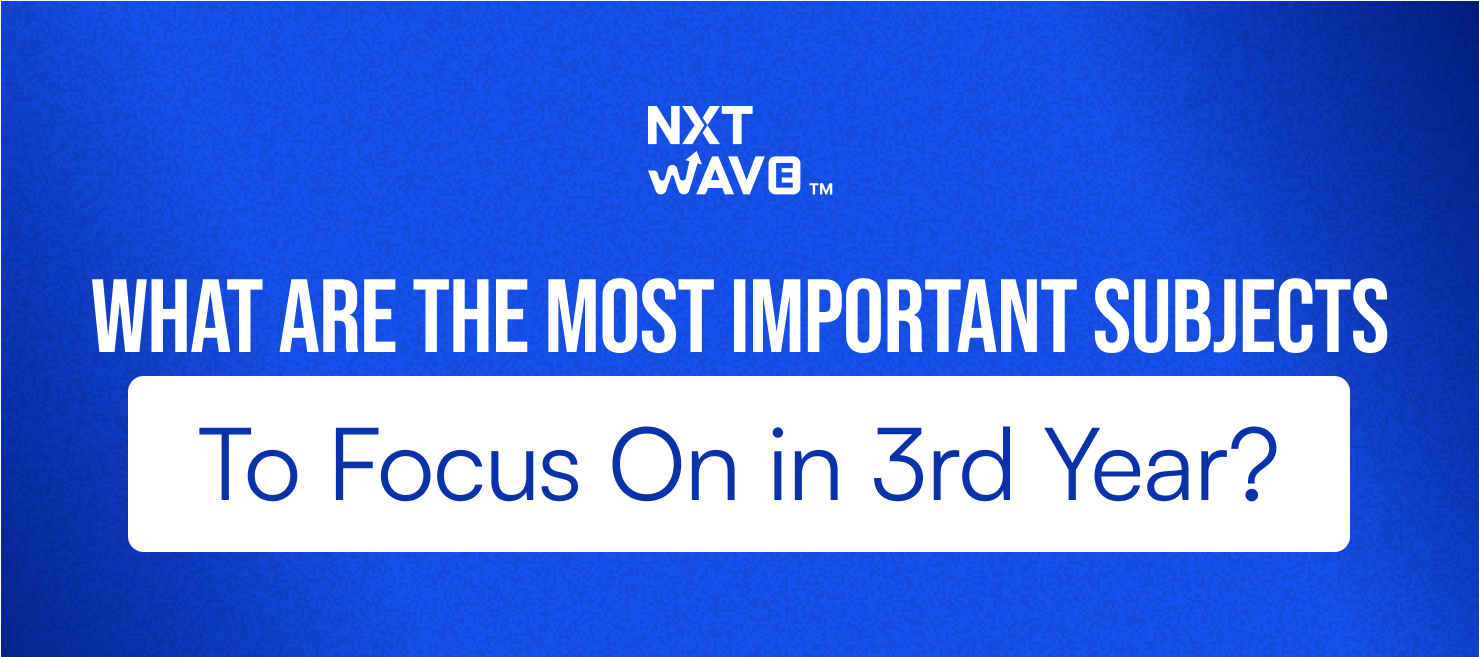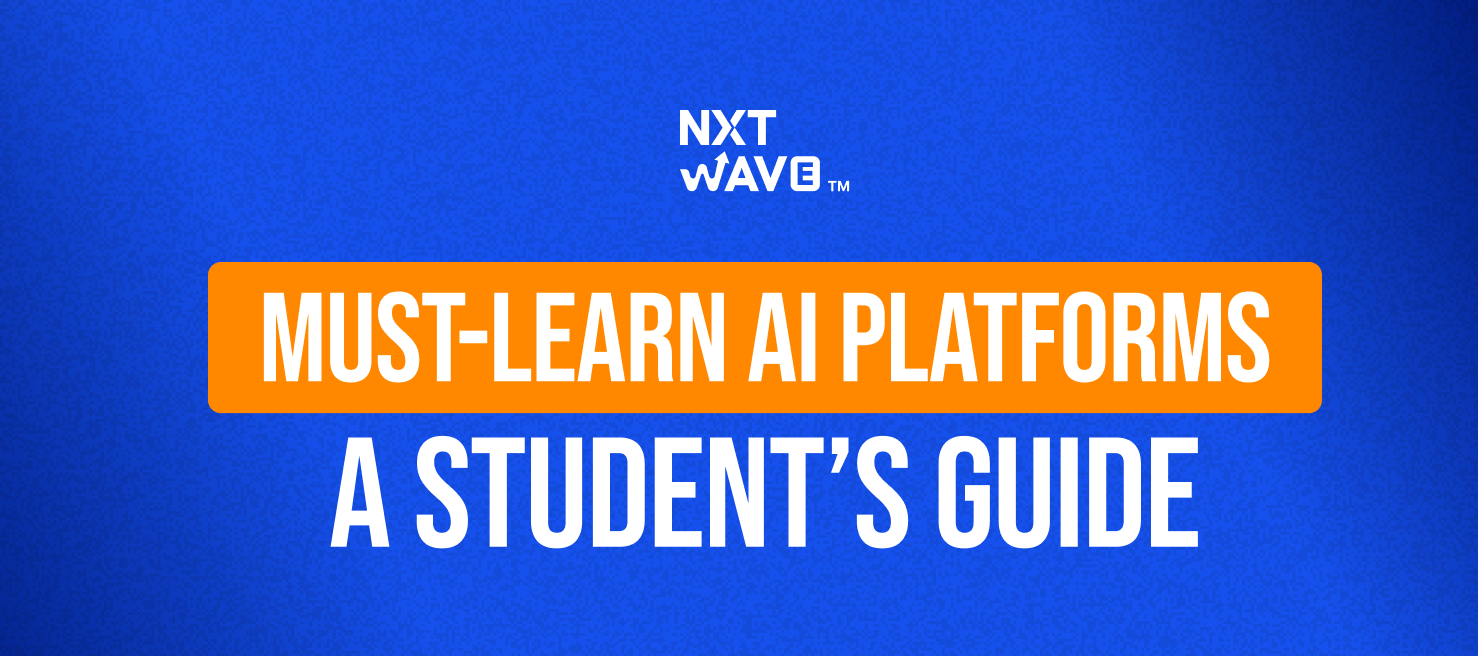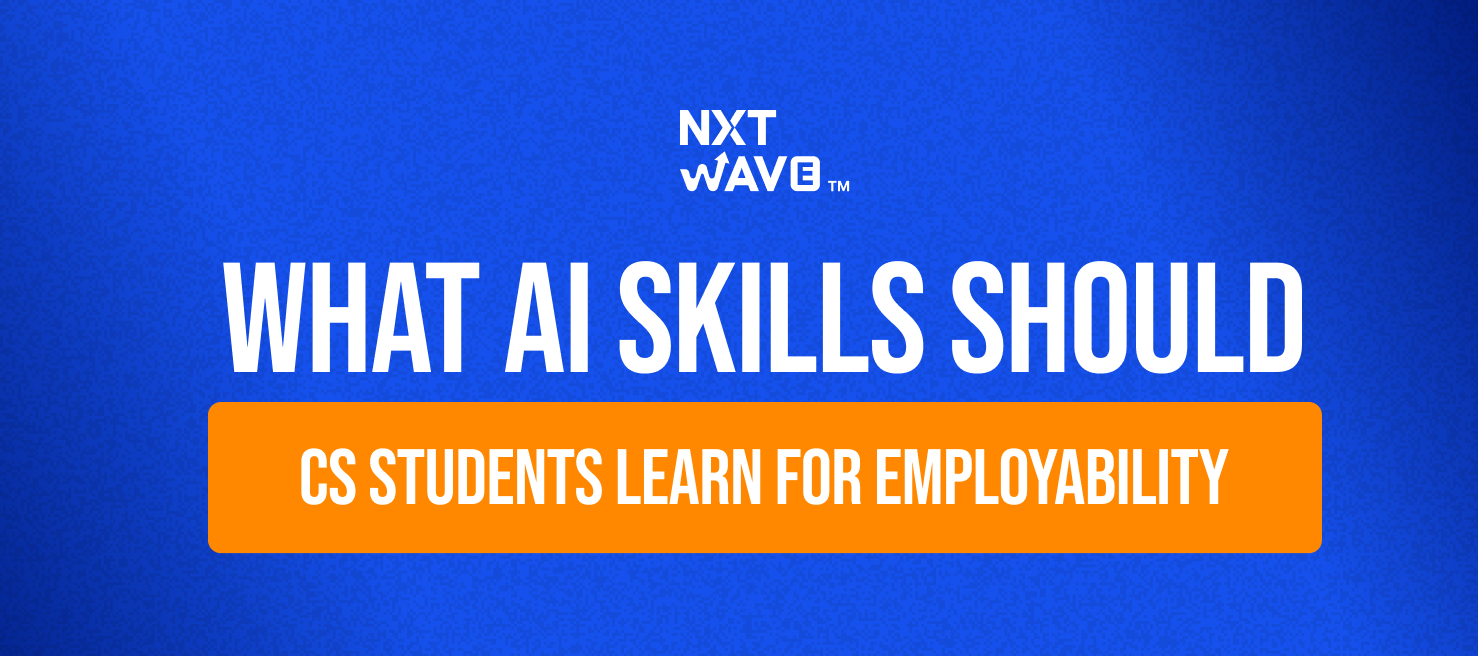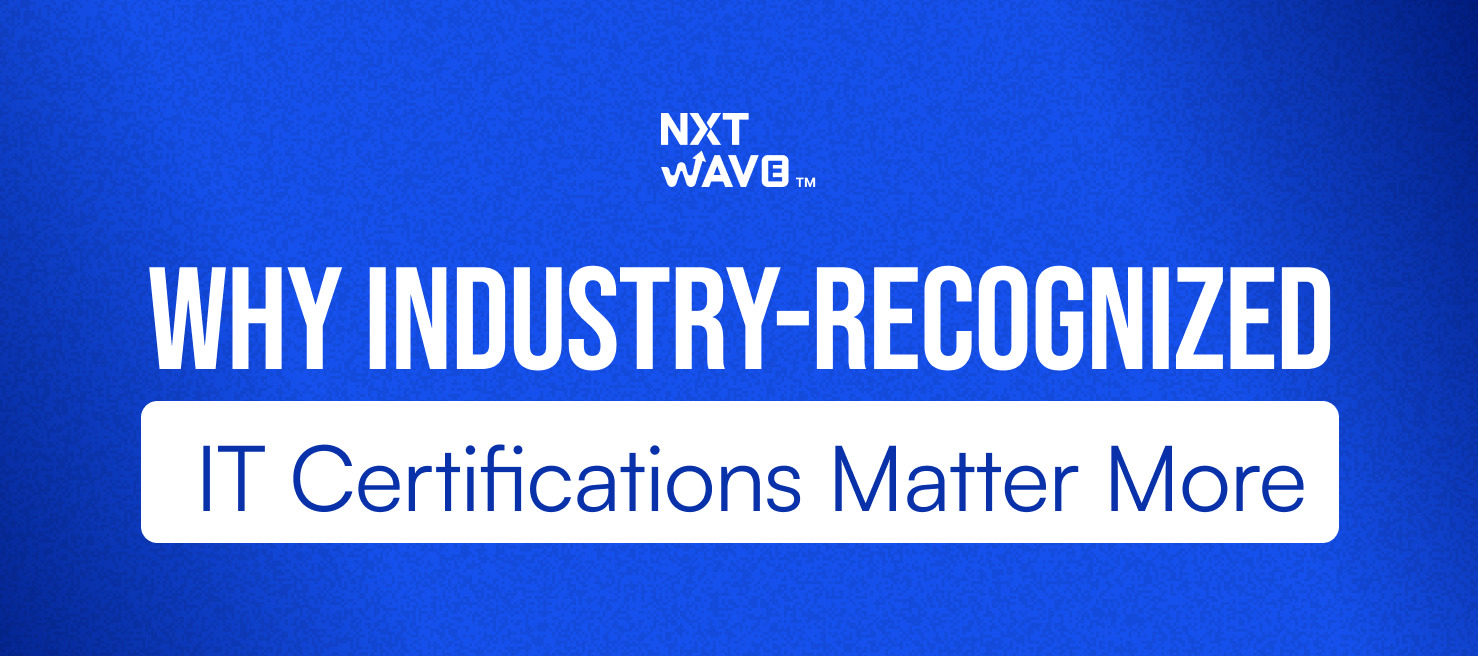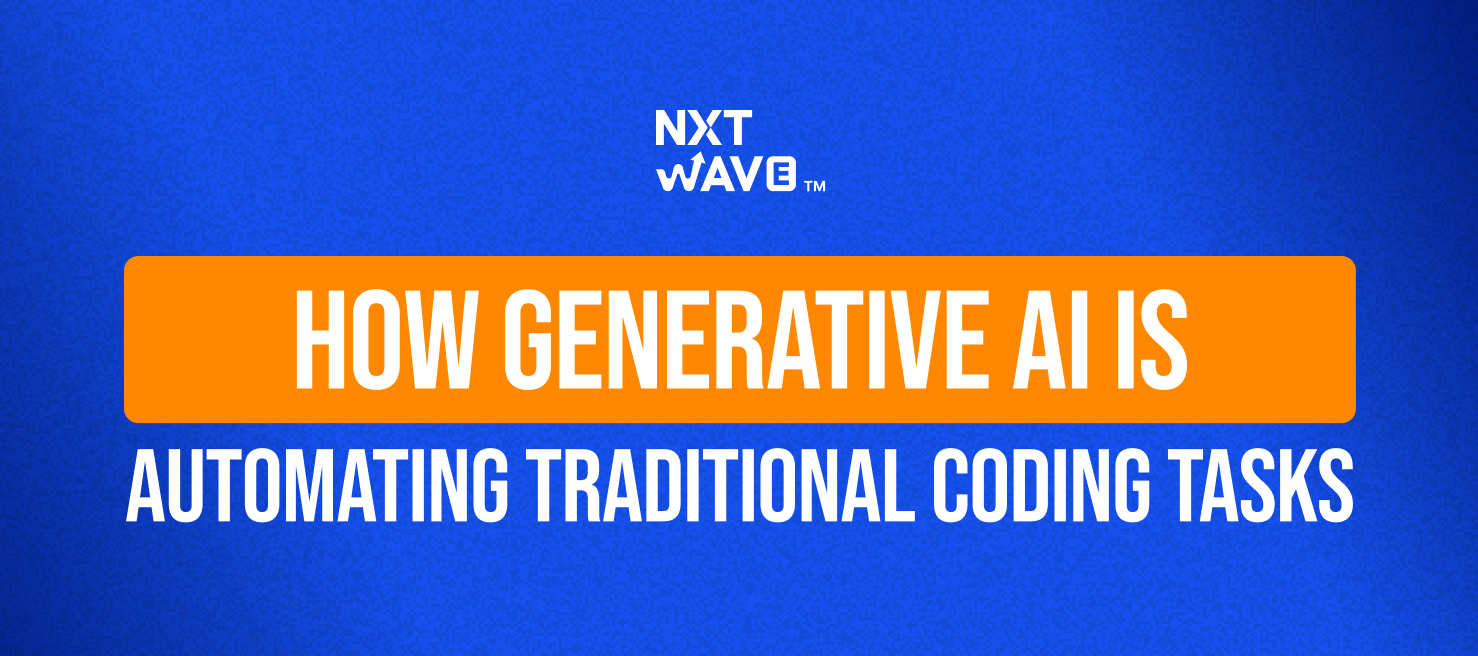The third year in B.Tech Computer Science and Engineering is the turning point that builds technical skills and career opportunities for students. As per the statistics given by the All India Council for Technical Education (AICTE) and premier institutes like IIIT Hyderabad and VIT, as much as more than 65 per cent of total CSE students get internships or jobs on the basis of their third-year academic performances and projects.
On the other side, surveys conducted by the AICTE's Student Learning Assessment Report inform that almost 70% of the students start saying that they found the following subjects, Algorithms, Operating Systems, and Networking, rather tough because there are electives to manage and projects to be balanced. Additionally, approximately 80% of recruiters ask about core subject knowledge when considering placements. Therefore, addressing study-related difficulties, effective time management, and wise subject choices can lead the way toward fruitful internships, campus placements, and advanced education in rapidly evolving technological fields.
Critical Subjects to Focus on in 3rd Year of B.Tech CSE
The third year of B.Tech. in Computer Science and Engineering (CSE) marks a transition to advanced technical and career-oriented programs. The subjects on which you focus in here usually determine your success with placements, internships, and further studies. Here are the most significant core subjects and the reason for their importance:
- Design and Analysis of Algorithms (DAA): Learn to develop efficient algorithms, analyze time and space complexity, enhancing problem-solving skills that are crucial for coding interviews and real-world applications in software development.
- Operating Systems (OS): Understand how computers manage hardware resources like CPU, memory, and storage. Learn process scheduling, synchronization, and security, which form the base for system programming and managing complex software.
- Database Management Systems (DBMS): Study how to organize, store, and retrieve data using relational databases and SQL. Learn database design, normalization, transactions, which are key for backend and data-driven application development.
- Computer Networks: Explore communication between computers through protocols, addressing, routing, and network security fundamentals. Essential for networking, cybersecurity, cloud services, and modern distributed applications.
- Software Engineering: Focus on software development lifecycle, methodologies like Agile, testing, version control, and teamwork. It prepares students for project management and collaborative software creation in professional environments.
- Compiler Design: Learn how source code translates into machine code via lexical analysis, parsing, and optimization. Essential for understanding programming languages, interpreters, and language processing tools.
- Theory of Computation / Automata Theory: Study theoretical models like finite automata and Turing machines to understand computational limits, formal languages, and complexity, which underlie advanced computer science concepts.
- Electives: Specialize in cutting-edge fields such as AI, ML, Cybersecurity, or Cloud Computing. These electives build industry-relevant skills to excel in evolving technology industry.
How to Balance Core Subjects and Electives Effectively in 3rd Year B.Tech CSE
By balancing core subjects and electives, you will get the maximum learning experience while managing an effective workload, complimenting your studies, and somehow attaining your career goals. The following are some of the best strategies on this subject, intended for third-year B.Tech CSE students:
1. Give Preference to Core Subjects
Core subjects such as Data Structures Algorithms, Operating Systems, DBMS, and Computer Networks would be your foundation; therefore, knowledge is essential for placement and further studies. Create some solid time blocks for these subjects, with focus they carry more weightage in exams and interviews.
2. Choose the right Electives
Select electives that interest you and are in demand in the current industry, such as Artificial Intelligence, Machine Learning, Cloud Computing, or Cybersecurity. They are necessary to specialize and build up your resume, but should not be core subjects.
3. Balance Your Study Hours
Make a weekly schedule which ensures how much time you will dedicate to the core and elective subjects. Buffer time should also be kept for projects and practical work that comes along with electives.
4. Linking Practical Implementation
Use project work and labs from the electives to reinforce the theoretical concepts from the core subjects. Practical exposure would boost one's understanding of the subjects and employability.
5. Evaluate and Readjust
Track your performance regularly in the core and elective subjects. You should adjust the time you allocate for some subjects depending on their demands.
6. Do not Select Electives
Do not select for elective courses burdening yourself in one semester that may undermine the study of core courses. Remember, quality is more important than quantity.
7. Effective Study Resources
Efficiently learn any concept in both core and elective subjects using online platforms and peer study groups.
8. Seek Guidance
Consult seniors, faculty, or mentors regarding the choice of electives and management of the workload. They may offer useful insights on the difficulty level, relevance, and pacing of each subject.
Study Resources and Smart Techniques to Master Core Subjects
Efforts during your third year for a B. Tech in Computer Science and Engineering must be focused, working hard on core subjects, honing practical programming skills, and getting exposed to industry-relevant technologies. Best resources and study techniques for you will efficiently grasp these areas for strong placements and a tech career.
Top Study Resources
- NxtWave CCBP 4.0 Intensive Program: NxtWave’s CCBP 4.0 program delivers a project-driven curriculum in full stack development (MERN stack), cloud computing, AI, and machine learning. With continuous coding practice, industry projects, personalized mentorship, and placement readiness support, CCBP 4.0 transforms theoretical knowledge into practical, job-market skills that run parallel to your core academics.
- International Online Learning Platforms: Many platforms like coursera offer a variety of computer science and engineering courses from some of the best universities. These include courses in core subjects like Algorithms, Operating System, Computer Networks, and Database Systems. These courses are well-structured and have flexible modules, professional certification options, and also involve practical projects, making a foundation for exams and placements.
- Coding Practice Platforms: LeetCode, HackerRank, and Codeforces help you build sharp programming and problem-solving abilities crucial for technical interviews. Daily coding challenges and mock contests simulate real-world hiring scenarios and help you measure progress.
- Standard Reference Textbooks: Classic books like “Introduction to Algorithms” (CLRS), “Operating System Concepts” by Silberschatz, “Database System Concepts” by Korth, and “Computer Networking” by Tanenbaum provide deep conceptual clarity and rigorous exercises essential for university syllabi and top-tier placements.
- Mock Tests and Previous Year Papers: Solving sample question papers and participating in mock exams greatly familiarize you with the exam formats, improve your time management skills, and highlight areas that require extra focus.
- Peer Study Groups and Online Forums: Peer discussions and participation in online communities (such as WhatsApp/Discord student groups and tech forums) foster collaborative learning, faster doubt resolution, and group motivation.
Smart Study Techniques
- Active Recall and Spaced Repetition: Use flashcards and scheduled review sessions to reinforce long-term retention of concepts, formulas, and processes.
- Mind Maps and Flowcharts: Create visual aids for processes such as OS scheduling or database normalization to link ideas and facilitate quicker revision.
- Practice Teaching: Explaining technical concepts to peers or juniors cements your understanding and exposes knowledge gaps.
- Dedicated Weekly Scheduling: Break your semester’s syllabus into manageable week-to-week blocks, track goals, and avoid last-minute cramming.
- Combine Theory and Practice: After studying theory, implement small code projects or run simulations to apply what you’ve learned, building both understanding and confidence.
- Concise Revision Notes: Summarize each topic with key definitions, diagrams, and formulas to create effective last-minute revision tools.
- Faculty and Mentor Support: Regularly attend doubt-clearing sessions and seek personalized feedback from mentors or faculty, ensuring persistent conceptual clarity.
Finding the Right Mentorship and Academic Support
Accessing effective mentorship and strong academic support can dramatically enhance your learning experience, helping you clarify concepts, gain career guidance, and achieve your academic and professional goals. The strategies below outline how you can connect with the right mentors and make the most of academic resources.
- Structured Study Schedules: Break down your syllabus into manageable segments with weekly micro-goals and regular reviews.
- Active Recall and Spaced Repetition: Use flashcards and scheduled revision to boost long-term retention.
- Practice-Oriented Learning: Complement theoretical study with practical application through coding, group projects, and simulations.
- Mock Tests and Past Papers: Regularly attempt old exam papers to understand patterns and improve time management.
- Summary Notes and Mind Maps: Create concise notes and visual diagrams for key concepts, aiding quick revision.
- Group Study and Peer Teaching: Collaborative learning helps clarify doubts and reinforces knowledge by teaching others.
Effective Strategies to Prepare for Exams and Projects
Preparing efficiently for exams and projects can significantly boost your performance and reduce stress. Adopting structured approaches and consistent study habits ensures deeper understanding and timely completion of your academic requirements.
- Ask Faculty: Make use of professors' office hours and mentoring sessions to clear doubts and solicit feedback on projects and research ideas.
- Mentorship: Enrol in programs like NxtWave CCBP 4.0, which provides practical mentoring, portfolio development, and personalized placement support according to industry needs.
- Networking with Peers: Sharing knowledge and supporting one another through online forums, Discord/WhatsApp study groups, and student clubs will help you find collaborative engagement with your fellow students.
- International Learning Platforms: Use global resources such as Coursera to connect with instructors and communities worldwide, broadening your academic and professional network.
Conclusion
In conclusion, concentration on these core subjects in the third year provides a strong technical foundation for you and allows you to develop analytical, programming, and project skills necessary for campus placements and higher studies. Proficiency in topics such as algorithms, operating systems, databases, and networks are highly regarded by both employers and academic institutions. Combining core study with chosen electives and practical applications sets you up for success in an ever-changing global technology arena, providing the way into specialized career tracks or higher education.
Frequently Asked Questions
1. Which subjects are most important to focus on in 3rd year CSE?
Core subjects like Algorithms (DAA), Operating Systems (OS), Database Management Systems (DBMS), Computer Networks, Software Engineering, Compiler Design, and electives such as AI, Machine Learning, and Cloud Computing are critical. Excelling in these builds a strong foundation for placements, advanced studies, and keeps you aligned with industry trends.
2. How can I choose the right electives?
Start by assessing your career goals and interests—for instance, software development, data science, or cybersecurity. Stay updated with industry trends and seek guidance from mentors or seniors. Also, evaluate the electives’ syllabus and project work to find practical relevance and opportunities that match your aspirations.
3. What are the best resources to study core subjects?
Utilize NxtWave CCBP 4.0 for hands-on, mentorship-driven learning with industry projects. Supplement this with internationally recognized platforms like Coursera for flexible, certified courses. Practice coding on LeetCode and HackerRank, and refer to standard textbooks such as CLRS (Algorithms) and Silberschatz (Operating Systems).
4. How can I overcome challenges in tough subjects?
Break difficult topics into smaller parts and use high-quality resources. Don’t hesitate to seek help early from faculty, mentors, or peers. Regular self-assessment through mock tests coupled with hands-on projects builds confidence and understanding.





